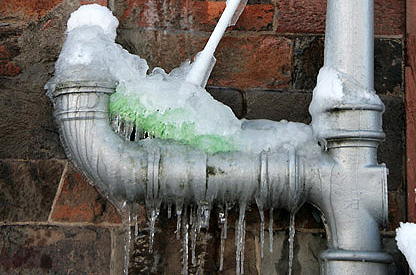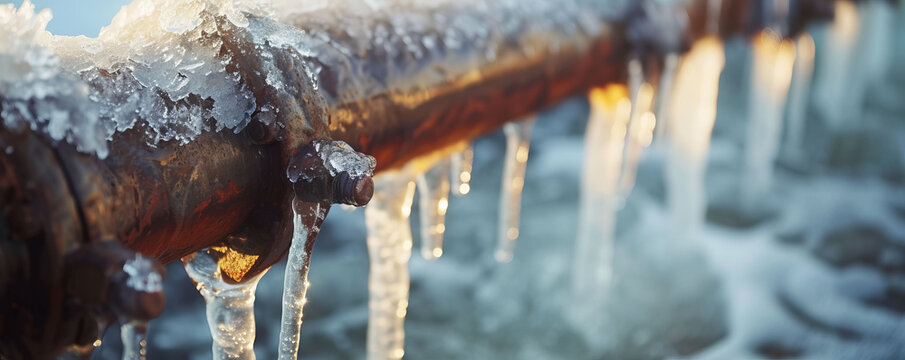Crucial Tips to Avoid Frozen Pipes in Cold Weather: Professional Insights
Crucial Tips to Avoid Frozen Pipes in Cold Weather: Professional Insights
Blog Article
We've stumbled on this post on Prevent Frozen Pipes below on the internet and concluded it made good sense to share it with you on this site.

Cold weather can wreak havoc on your pipes, especially by freezing pipelines. Here's exactly how to stop it from happening and what to do if it does.
Introduction
As temperatures decline, the threat of frozen pipelines rises, potentially leading to expensive repairs and water damage. Recognizing how to avoid icy pipes is vital for homeowners in chilly environments.
Recognizing Frozen Pipes
What creates pipelines to freeze?
Pipes ice up when exposed to temperatures listed below 32 ° F (0 ° C) for extended durations. As water inside the pipelines freezes, it increases, taxing the pipe wall surfaces and possibly creating them to break.
Risks and damages
Frozen pipelines can cause supply of water interruptions, residential property damages, and expensive repair services. Ruptured pipelines can flood homes and create extensive architectural damage.
Indicators of Frozen Piping
Determining icy pipelines early can avoid them from rupturing.
Just how to identify frozen pipes
Try to find lowered water circulation from taps, unusual smells or sounds from pipes, and noticeable frost on revealed pipelines.
Prevention Tips
Protecting prone pipelines
Wrap pipelines in insulation sleeves or use heat tape to protect them from freezing temperatures. Focus on pipelines in unheated or outside locations of the home.
Heating strategies
Maintain indoor areas effectively heated up, especially areas with pipes. Open up cupboard doors to enable warm air to circulate around pipes under sinks.
Safeguarding Exterior Pipes
Garden tubes and outdoor faucets
Disconnect and drain pipes garden hose pipes prior to wintertime. Set up frost-proof faucets or cover outside taps with shielded caps.
What to Do If Your Pipelines Freeze
Immediate actions to take
If you think frozen pipelines, keep faucets open to relieve stress as the ice melts. Use a hairdryer or towels taken in hot water to thaw pipelines slowly.
Long-Term Solutions
Architectural modifications
Consider rerouting pipelines away from outside walls or unheated locations. Include additional insulation to attic rooms, basements, and crawl spaces.
Updating insulation
Invest in top notch insulation for pipes, attics, and wall surfaces. Proper insulation assists keep consistent temperatures and minimizes the threat of frozen pipes.
Final thought
Protecting against frozen pipes needs aggressive measures and quick reactions. By comprehending the causes, indications, and safety nets, home owners can protect their pipes throughout winter.
Helpful Tips to Prevent Frozen Pipes this Winter
UNDERSTANDING THE BASICS: WHY PIPES FREEZE AND WHY IT’S A PROBLEM
Water freezing inside pipes is common during the winter months, but understanding why pipes freeze, and the potential problems it can cause is crucial in preventing such incidents. This section will delve into the basics of why pipes freeze and the associated problems that may arise.
THE SCIENCE BEHIND FROZEN PIPES
When water reaches freezing temperatures, it undergoes a physical transformation and solidifies into ice. This expansion of water as it freezes is the primary reason pipes can burst. As the water inside the pipe freezes, it expands, creating immense pressure on the walls. If the pressure becomes too great, the pipe can crack or rupture, leading to leaks and water damage.
FACTORS THAT CONTRIBUTE TO PIPE FREEZING
Low Temperatures: Extremely cold weather, especially below freezing, increases the risk of pipes freezing. Uninsulated or Poorly Insulated Pipes: Pipes located in unheated areas, such as basements, crawl spaces, or attics, are more prone to freezing. Insufficient insulation or lack of insulation altogether exacerbates the problem. Exterior Wall Exposure: Pipes running along exterior walls are susceptible to freezing as they encounter colder temperatures outside. Lack of Heating or Temperature Regulation: Inadequate heating or inconsistent temperature control in your home can contribute to frozen pipes. PROBLEMS CAUSED BY FROZEN PIPES
- Pipe Bursting: As mentioned earlier, the expansion of water as it freezes can cause pipes to burst, resulting in significant water damage.
- Water Damage: When pipes burst, it can lead to flooding and water damage to your property, including walls, ceilings, flooring, and personal belongings.
- Structural Damage: Prolonged exposure to water from burst pipes can compromise the structural integrity of your home, leading to costly repairs.
- Mold and Mildew Growth: Excess moisture from water damage can create a favorable environment for mold and mildew growth, posing health risks to occupants.
- Disrupted Water Supply: Frozen pipes can also result in a complete or partial loss of water supply until the issue is resolved.
WHY CERTAIN PIPES ARE MORE PRONE TO FREEZING
- Location: Pipes located in unheated or poorly insulated areas, such as basements, crawl spaces, attics, or exterior walls, are at higher risk of freezing.
- Exterior Pipes: Outdoor pipes, such as those used for irrigation or exposed plumbing, are particularly vulnerable to freezing as they are directly exposed to the elements.
- Supply Lines: Pipes that carry water from the main water supply into your home, including the main water line, are critical to protect as freezing in these lines can affect your entire plumbing system.
- Underground Pipes: Pipes buried underground, such as those connected to sprinkler systems or outdoor faucets, can be susceptible to freezing if not properly insulated.
https://busybusy.com/blog/helpful-tips-to-prevent-frozen-pipes-this-winter/

I recently found that entry on How To Avoid Freezing Pipes when doing a search on the search engines. Liked our piece of writing? Please quickly share it. Let another person check it out. I praise you for being here. Don't forget to pay a visit to our blog back soon.
Click Here Report this page